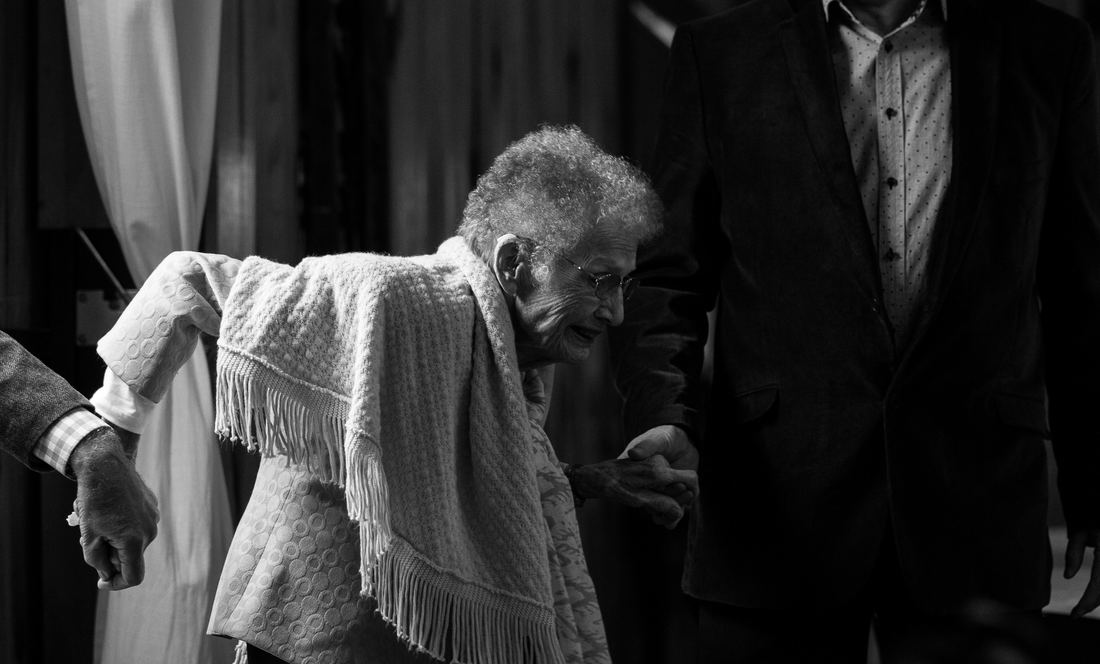|
These tips come to you from Cindy Swanson, a personal advisor for clients of Fairview’s Caregiver Assurance program. Martin Luther and Ebenezer work with Fairview to provide Nationally-recognized care for seniors. Caring for a senior is a difficult challenge for anyone to take on (but a rewarding one). Before you begin, this guide will help prepare you for what to expect when you start caring for a senior. 1. The situation could be more demanding than you thought.Your aging relative or friend’s need for help has probably been coming on gradually, as they’ve become less capable of managing the demands of daily life–like keeping up the house. “You’ve been to see your parents and they worked hard to get it ready for a visit,” Cindy says, “but you may not notice that newspaper stack is getting higher and higher, and the recycling isn’t going out. When we’re going to our parents’ home, that’s just the status quo. We’re sometimes not realizing it’s getting less clean and less organized." It may be hard for them to admit to you they can’t mow the yard anymore or lift the ladder to clean out the gutters. So be prepared, once you’ve committed to start helping a senior, to discover that they may have let things go more than you knew. 2. You may need to set some realistic boundaries.“A common thing that happens is that someone’s in the hospital–maybe it’s mom’s first fall–and she’ll tell the social worker: ‘My daughter can stop by every night after work and bring me meals.’ It’s not uncommon for someone in the hospital to say they have family that can do all this without talking to the family,” Cindy says. “The daughter will say: ‘I live 30 miles away on the other side of the cities. It’ll take me an hour to get there after work. I can’t do that.’ What a parent sees as realistic may not be the same as reality.’ " Especially if you’re juggling a career and your own family on top of helping a parent stay in their own home, you may find yourself spread a little thin. “There’s a point where you become resentful of having to do that,” Cindy says. “You need to figure out how much you can do without creating negativity in your life." 3. Your senior’s new situation may reignite old family tensions.What’s happening with your parents in their later years is emotional enough, but coming to a consensus about what to do can be rough on even the tightest of siblings. Cindy describes a typical scenario: “We all know how our family operates. There’s nothing really happening, but there may be underlying tensions that naturally exist. Maybe the oldest son sees the younger son as always getting away with things he can’t. What happens under stress or in crisis is those things blossom.” Even if you agree to be the main caregiver at the start, you may end up feeling like your siblings aren’t pitching in enough. They may feel like they aren’t getting enough of a say. It’s easy in these situations to revert to old childhood patterns and bring up old hurts. Marin Luther Campus can help you manage a family conference to work through some of those issues 4. Caregiving can take a toll on your work life.Cindy knows a thing or two about that. Not only has she helped coach people through this, but she has firsthand experience. She helped take care of her parents and her husband’s parents. “What happens is, you spend your whole lunch hour calling people, then you go back to work and you’re waiting for those callbacks. If you’re trying to do a report and making calls for your parent, your 8 to 5 schedule might become 8 to 7. Or you say, ‘I’ll do it at home,’ and you’re sitting there doing that report at 11 at night. How much sleep do you get?” “There I was, caregiving for my in-laws and my parents, all four of them, trying to keep track of doctor appointments, who was needing services, who needed home care,” Cindy says. “And I was holding a mid-management position in a hospital. It wasn’t realistic that I could juggle it all.” 5. You’ll need to learn things you never needed to know before.At your age, you may not know how often an older person should get a colonoscopy. Adult day care may be a complete mystery to you. And you certainly haven’t spent a lot of time investigating how to buy a Medicare plan. “You’re going to run into a whole lot of things you’ve never dealt with before,” Cindy says. “Things that even a college- educated person is going to have difficulty with: Looking at your parent’s financial situation and how to deal with that. Finding financial planners or attorneys, somebody who understands elder law. That’s why you’d connect with a program like us. I know some things myself, and I know several reputable firms in the Twin Cities.” 6. You're a giver, so beware of neglecting yourself.People who take on the role of caring for an elderly relative may naturally be the type of person who thinks of everyone else’s needs before their own. But that can last only so long. Cindy paints a picture of life as four glasses of water and a pitcher: “Your glasses might be your husband, your son, your 14-year-old-daughter and your parents. You keep everybody’s glass full, but where’s the pitcher for you? People keep pouring, and pretty soon the pitcher’s empty.” Keeping your own glass full is something the personal advisors at Caregiver Assurance can help with. “There was a time when it wasn’t accepted that you would put yourself first,” Cindy says. “It’s not about putting yourself first, but doing your caregiving AND knowing how to take care of yourself.” 7. Caring for a senior may be the most rewarding thing you’ll ever do.That reward could be as simple as spending more time with your loved one and finally hearing the story behind that one photo in the dining room. It can be the peace of mind knowing that they’re safer when you check on them every day. It can be giving back to somebody who has given so much to you.
“My dad never wanted to go into a nursing home,” Cindy says. “Feeling that I was honoring his wishes, I look back at it and I feel lucky.” No matter how frustrating or rewarding it is to help an aging loved one, you don’t have to do it alone. “There isn’t a classroom you can go to and learn all of this,” Cindy says. “Whatever the journey is, there’s help. If you have to make a right turn, there are people who are able to help you along. That’s what we’re trying to do here at Caregiver Assurance.” Martin Luther Campus also has resources available to assist caregivers, including Adult Day Programs and Stay By the Day services. Martin Luther Campus is part of the Ebenezer family of Lutheran Senior Care Communities. We provide transitional care and assisted living apartments for seniors in Bloomington. We also have adult day clubs and memory care programs for seniors living at home. We’re located at 1401 East 100th St. Bloomington, MN. Are you interested in transitioning to assisted living or do you have a loved one that needs assisted living? Call us at 952.888.7751.
21 Comments
Forty percent of adults are looking after an aging loved one. It could be any relative or even a neighbor, but it’s usually a parent. “I see a lot of stressed out 40- to 60-year-olds who are trying to manage a career, kids and their parents,” said Kim DeRoche, MD of Fairview. “I hear about it when a woman comes in for her ‘annual’ physical and hasn’t been in for three or four years. They know they’re not taking care of themselves the way they did before they had to take care of someone else.” It’s especially challenging with seniors living longer these days and expecting to stay in their own homes longer. Someone has to step up to help with the things they can’t do for themselves. Do Any of These Sound Like Your Life?
This can be a scary time, but you’re not alone. If you need help caring for your loved one, it may be time to consider a memory care center. You can find simple tips for having that conversation with your loved ones on our blog, and contact us for a one-on-one meeting to help you lift the burden off your shoulders. It’s only natural to want the best for your loved ones, but you need to take care of yourself as well. Let Martin Luther Campus help your loved ones so you can focus on you and your family. Martin Luther Campus is part of the Ebenezer family of Lutheran Senior Care Communities. We provide transitional care and assisted living apartments for seniors in Bloomington. We also have adult day clubs and memory care programs for seniors living at home. We’re located at 1401 East 100th St. Bloomington, MN. Are you interested in transitioning to assisted living or do you have a loved one that needs assisted living? Call us at 952.888.7751. This blog comes from Marysue Moses, Ebenezer Dimensions Program Coordinator One of the things I’ve noticed is that dementia specialists are not always on the same page about the issue of telling “therapeutic fibs” to the person living with dementia, in order to minimize upset and anxiety for the person. This can be a sticky wicket for care partners, too. Often our moral compass tells us it is not acceptable to tell a lie to a person we love. And yet, we hear (and I believe) that it is important to give persons with dementia answers that make sense to the way they see the world. In fact, we have to reflect their truth back to them. As trainer Megan Carnarius says, “They can’t cross to our side of the street anymore, but we can go to theirs”. How to Tell the Truth (Without Telling the Truth)As dementia progresses, people with dementia may well lose the sense of how old they are, or where they are in their own life story. It would be devastating for a person with dementia who believes their mother to still be alive to be repeatedly told that her mother has died. To force a person with dementia to experience that grief again and again would be cruel. If a person is missing their mother and wondering where she is, it is much kinder to provide a question or a comment that validates the person’s affection for her mother, i.e., “You sure do love your mother! Tell me more about her!” might do the trick. If the person is fixated on where her mom is at this moment, see if you can coax out a reasonable possibility, i.e. “What does your mom like to do?...Oh, she’s a gardener! It’s such a nice day, do you think she’s tending to her vegetables?...What does she plant?” Then divert the person’s attention further as you talk about vegetables, flowers, food or wherever the train of thought takes you both. Telling an Emotional TruthIn the book, Talking to Alzheimer’s (an excellent, easy to read resource book that has served me well since I first got hold of it many years ago), Claudia J. Strauss discusses this issue and provides a great deal of clarity. She says there is no hard and fast rule about telling the truth to a person with dementia, but her advice is as follows:
“If you can’t give a truthful answer that is believable or acceptable at the cognitive level, then tell an emotional truth.” How does one offer an emotional truth? By validating the emotion behind the person’s comment, question or request. And expressing interest in something related to the person’s fixation. For example, if the person is distressed about their living situation and needing to get “back home,” one might reply, “Well, there’s no place like home, is there! What do you like best about home?” We often are afraid that if we encourage such conversation it could make the person more upset, but I have found the effect is quite the opposite. Human beings need and want to express the things that are on their mind. Persons with dementia are no exception. If your loved one asks for something it is simply impossible to give them, i.e. “Take me home, right now!” you can say, “Oh, I wish I could, Mom.” Then take a pause. Breathe. Key into the person’s emotional state. Offer some empathy. “I know you miss your old place, and this one seems new and strange. What do you miss most about the old place?” Be brave! You just might learn something by their response to that question that gives you a clue about making them feel more at home in their new environment. Think less about “fixing” all of the person’s anxieties or complaints and more about validating them. “I can see why you feel that way,” “I’d feel that way too, if I were you!” and “I’m so sorry. I know this is hard” may all come in handy. I recommend practicing saying these things when you are alone, so that they may spring to your lips more readily when you are with your loved one! When we are stuck in “I have to fix this for them right now” mode, we end up conveying our own anxiety, unhappiness and stress to the person with dementia in the form of an argument, or through a valiant but ultimately futile attempt at logic. What the person needs from us is quite the opposite. When we visit, they need us to slow down, and to be where they are. In their moment, accepting the emotions they are feeling right now. See Talking to Alzheimer’s, by Claudia J. Strauss and Validation Techniques for Dementia Care by Vicki de Klerk-Rubin for more insight on this topic. Our memory care specialists are trained to help you and your loved one with dementia care. Learn more about how Martin Luther campus can help. Martin Luther Campus is part of the Ebenezer family of Lutheran Senior Care Communities. We provide transitional care and assisted living apartments for seniors in Bloomington. We also have adult day clubs and memory care programs for seniors living at home. We’re located at 1401 East 100th St. Bloomington, MN. Are you interested in transitioning to assisted living or do you have a loved one that needs assisted living? Call us at 952.888.7751. These tips come to you from Fairview’s Caregiver Assurance program. Martin Luther and Ebenezer work with Fairview to provide Nationally-recognized care for seniors. You’re doing what any good person would do, trying to keep tabs on a loved one who’s growing older. You’re afraid to broach the idea of getting involved in their affairs, because you don’t want to hurt their feelings–or worse, start a fight. Maybe you’ve even tried to offer your help, only to get rebuffed. Heidi Sklenar Telschow, a personal advisor to clients of Fairview’s Caregiver Assurance service, knows it’s a predicament. She hears it on a daily basis. When a senior repeatedly resists help, “it creates a lot of frustration for the son or daughter or spouse,” Heidi says. “People will make unsafe and uninformed decisions, and you just want to throw your hands in the air and say, ‘I’m done.’ ” Getting Past Your FrustrationThe first step is understanding that your loved one isn’t necessarily just being stubborn. “It’s more about them being in denial of their actual abilities,” Heidi says, from their eyesight to whether they’re strong enough to handle the stairs. “It may take Dad slipping on those last two steps and getting a big bruise on his behind for him to realize.” Even if your loved one does grasp the situation, accepting your help can feel like surrender. “That final time they hand over those car keys and know they will never go to the store by themselves again, it’s handing over their independence,” Heidi says. “To lose that is like giving up who they’ve been their entire adult life.” Having the TalkHeidi has some tips for that difficult conversation about taking on some things your loved one can’t or shouldn’t be doing anymore. “Never present it as an ultimatum: ‘If you do that one more time, I won’t keep bringing the grandkids to visit.’ Like any transition in life, it has to be processed,” Heidi says. It’s also easy to fall into the trap of shaming or guilting your parent. You might be thinking, “Doing this for you is already hard enough; don’t make it any harder” or “I never signed up for this.” But saying it to them could increase whatever anxiety or depression they’re having about aging, making it even harder to accept your help and pushing the problem down the road. Bringing a neutral party into the conversation can often break a stalemate. “Try to have the advice come from someone else–me, a doctor, a mental health assessor,” Heidi says. “It takes the weight off the caregiver as the bad guy. You don’t have to be the one to pull the plug, so to speak. If it’s you as the caregiver harping on it, they’ll drag their feet.” That’s one reason why Fairview launched Caregiver Assurance, which gives you unlimited access to a personal advisor like Heidi and the option of visiting your senior’s home and hosting a family conference with you. “People always take me up on that,” she says. “No one ever says, ‘Let me be the one to break Dad’s heart.’ ” Martin Luther Campus also offers on-site assistance and one-on-one meetings to help you have that difficult conversation. Accepting What You Can't ControlIn the end, the senior is still in control. Just because you choose to watch out for them or it’s fallen to you, it doesn’t mean they’ll let you make all the decisions while they’re still living in their own home. So expect to draw on your deepest reservoir of patience.
“People aren’t going to hear a recommendation just once and accept it,” Heidi says. “People need time to weigh their options. Reassure them that you’re there for them and will do everything you can for their safety, and when they’re ready to make those brave steps for change, you’ll be there for them no matter how long it takes. Wrap them in support.” If you’re having difficulty speaking to a loved one, Martin Luther Campus can help. Our memory care experts have years of experience working with seniors. Contact us to today for a free appointment. Martin Luther Campus is part of the Ebenezer family of Lutheran Senior Care Communities. We provide transitional care and assisted living apartments for seniors in Bloomington. We also have adult day clubs and memory care programs for seniors living at home. We’re located at 1401 East 100th St. Bloomington, MN. Are you interested in transitioning to assisted living or do you have a loved one that needs assisted living? Call us at 952.888.7751 |
Director of Community Relations
Hello friends, my name is Kate and I'd love to share with you ALL of the wonderful things happening at Martin Luther Campus. Be sure to check our Blog, Lifestyle page and Facebook page often to stay updated on the happenings at our community! Archives
November 2023
Categories |
|
telephone |
|
DIRECTIONSimap
|
© 2021 Fairview Health Services
|





 RSS Feed
RSS Feed

